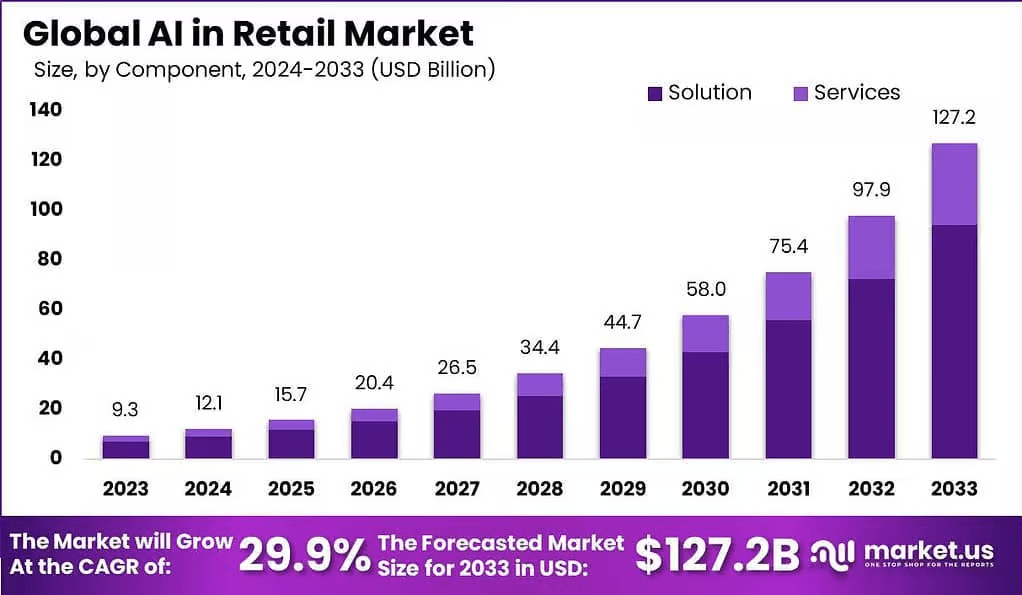Introduction
The AI in Retail Market is rapidly transforming the way businesses interact with consumers, optimize operations, and forecast demand by infusing intelligence into every layer of the retail value chain. From personalized shopping experiences and dynamic pricing to inventory automation and customer service chatbots, artificial intelligence is redefining traditional retail models. As consumer expectations shift toward speed, personalization, and omnichannel convenience, retailers are turning to AI-powered solutions to gain competitive advantage, enhance decision-making, and streamline everything from supply chains to storefronts.

Key Takeaways
AI adoption in retail is accelerating due to the need for hyper-personalization, real-time insights, and improved operational efficiency. Retailers are leveraging AI for customer analytics, fraud detection, demand forecasting, and inventory optimization. E-commerce giants and brick-and-mortar retailers alike are integrating AI to drive seamless omnichannel experiences. North America leads in innovation and deployment, while Asia-Pacific is showing explosive growth due to rapid digital transformation. Key trends include the rise of AI-generated content for marketing, autonomous checkout systems, and AI-driven sustainability strategies for smarter resource management.
Component Analysis
Core components of AI in retail include machine learning algorithms, natural language processing (NLP), computer vision, recommendation engines, and predictive analytics platforms. Machine learning enables dynamic pricing and customer segmentation, while NLP powers chatbots and virtual assistants for customer service. Computer vision is used in smart checkout systems, shelf monitoring, and customer behavior analysis in stores. Recommendation engines personalize online and in-store experiences, increasing sales and engagement. Predictive analytics help forecast demand, optimize inventory, and plan promotions based on consumer behavior and historical data.
Service Analysis
Key services in the AI retail ecosystem include AI-powered marketing automation, customer experience management, supply chain analytics, smart merchandising, and real-time fraud prevention. Retailers rely on AI-driven services to automate email campaigns, track shopper journeys, and enhance loyalty programs. AI tools also help analyze footfall, optimize shelf space, and reduce out-of-stock incidents. Managed services and AI-as-a-Service (AIaaS) offerings are gaining traction, especially among small and medium retailers looking to harness enterprise-grade capabilities without major upfront investments. Consulting and integration services further support AI adoption and scalability across retail formats.
Key Player Analysis
Leading players in the AI in retail market include Amazon Web Services (AWS), IBM, Microsoft, Google Cloud, Salesforce, SAP, Oracle, and NVIDIA. Amazon leads with its AI-powered product recommendations and cashier-less Amazon Go stores. IBM and Google offer comprehensive AI toolkits for customer insights and retail optimization. Salesforce and Oracle focus on AI-infused CRM and marketing automation, while Microsoft Azure enables scalable AI deployments. NVIDIA supports AI in retail through high-performance computing for real-time analytics and computer vision. These players are continuously innovating through partnerships, acquisitions, and cloud-based platforms tailored for retail intelligence.
Top Market Leaders
- IBM Corporation
- Microsoft Corporation
- Oracle Corporation
- Google LLC
- NVIDIA Corporation
- Intel Corporation
- Amazon Web Services, Inc.
- SAP SE
- Salesforce, Inc.
- RetailNext, Inc.
- Accenture plc
- Other Key Players
Conclusion
AI is no longer optional in retail—it is a strategic necessity. From personalizing the shopper experience to automating backend operations, AI is shaping a smarter, more responsive, and profitable retail environment. As technology matures and competition intensifies, retailers that effectively leverage AI will lead the way in meeting the demands of tomorrow’s consumers.
The macro analyst desk brings highly sought after financial news based on market analysis, insider news and company filings.
